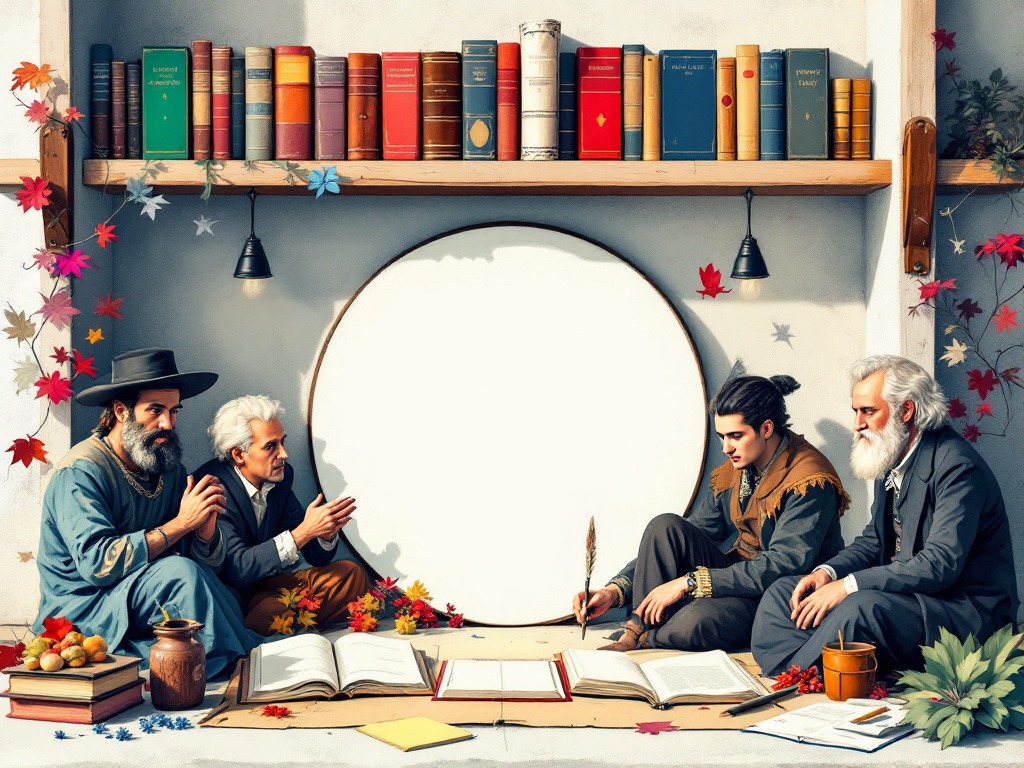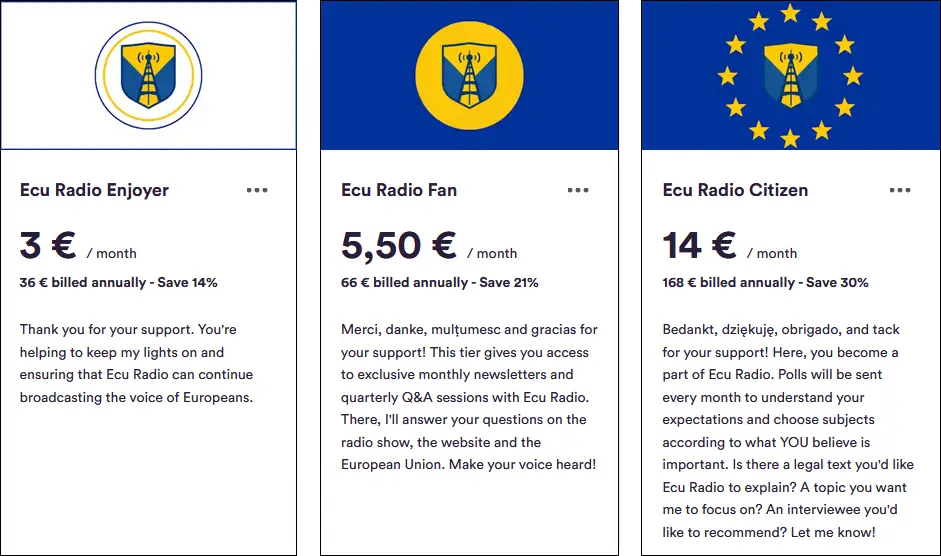
Reading. A fantastic activity that may seem outdated nowadays. A preconceived notion, as 38% of the EU population reads books regularly, according to this Eurostat study.
However, this figure might still seem low, and that’s why I’m discussing it today. With 2,000 years of literature, from Homer and Plato to the present, Europe boasts no shortage of great authors and fantastic books to immerse yourself in. Getting (re)started might even feel intimidating.
That’s why I’d like to introduce this great initiative: the Read Around Europe Challenge, where book lovers are tasked with reading at least one book written by an author from each of the 50 countries in Europe.
After free registration, the website allows you to track your progress through 2025. It also features filters to help you focus on your preferred genres, offering a selection of 3,241 great works in 19 different languages. Read European made easy.
And if you’re wondering what deserves a look, I’ve compiled the following list, celebrating each EU country. Feel free to follow it or browse the website to find what piques your fancy. Happy reading!
Read European Today
- Austria: Robert Seethaler – A Whole Life
- Genre: Historical Fiction
- A poignant novel that explores the life of Andreas Egger, a man who spends his entire existence in a remote valley in the Austrian Alps. The story is a meditation on solitude, resilience, and the beauty found in simplicity.
- Belgium: Georges Rodenbach – Bruges-la-Morte
- Genre: Symbolist Fiction
- A melancholic exploration of grief and obsession. Set in the hauntingly atmospheric city of Bruges, it follows Hugues Viane, a widower who becomes fixated on a woman resembling his late wife, leading to a tragic and eerie tale
- Bulgaria: Ivan Vazov – Under the Yoke
- Genre: Historical Fiction
- Considered the classic Bulgarian novel, set during the Ottoman rule, it portrays the struggles of Boycho Ognyanov and his fellow villagers as they prepare for the April Uprising of 1876.
- Croatia: Miroslav Krleža – On the Edge of Reason
- Genre: Psychological Novel / Satire
- On the downfall of a middle-aged lawyer who dares to speak an inconvenient truth at a party. As hypocrisy and absurdity pile up, the story critiques conformity and explores the fragile boundary between reason and madness.
- Cyprus: Alex Michaelides – The Silent Patient
- Genre: Psychological thriller
- The gripping story of Alicia Berenson, a famous painter who inexplicably shoots her husband and then falls silent. Her refusal to speak turns her into a media sensation, and she is confined to a psychiatric facility. Theo Faber, a criminal psychotherapist, becomes obsessed with uncovering the truth behind her silence, leading to a suspenseful and twist-filled journey into the depths of human psychology.
- Czech Republic: Milan Kundera – The Unbearable Lightness of Being
- Genre: Philosophical Fiction
- Explores the lives and relationships of Czech artists and intellectuals during the Prague Spring and Soviet invasion, it delves into Nietzsche’s concept of eternal return, contrasting the heaviness of responsibility with the lightness of fleeting choices.
- Denmark: Peter Høeg – Smilla’s Sense of Snow
- Genre: Thriller / Mystery
- Smilla Jaspersen, a Greenlandic scientist living in Copenhagen, investigates the suspicious death of a young inuit boy. Her expertise in snow leads her into a web of conspiracies, taking her from Denmark to the icy landscapes of Greenland.
- Estonia: Robert Kurvitz – Sacred and Terrible Air
- Genre: Philosophical / Speculative Fiction
- You won’t find this one at your library but it deserves your attention. Set in the same universe as Disco Elysium, it explores themes of loss, memory, and the enigmatic phenomenon of the Pale, as we follows the lives of the three protagonists grappling with the disappearance of their friend: the Lund sisters.
- Finland: Arto Paasilinna – The Year of the Hare
- Genre: Humorous Fiction / Satire
- Kaarlo Vatanen, a journalist who abandons his urban life after rescuing an injured hare, embarks on a whimsical journey through the Finnish wilderness, encountering eccentric characters and challenging societal norms along the way.
- France: Antoine de Saint−Exupéry – The Little Prince
- Genre: Allegorical Fiction
- A timeless novella about a young prince who travels from planet to planet, meeting various inhabitants and learning profound lessons about life, love, and human nature. Through its poetic narrative and whimsical illustrations, it explores themes of loneliness, friendship, and the importance of seeing with the heart.
- Germany: Erich Maria Remarque – All Quiet on the Western Front
- Genre: Anti-War
- A portray of the harrowing experiences of German soldiers during World War I through the eyes of Paul Bäumer. It critiques the romanticised notions of war, highlighting its devastating physical and psychological toll on young men.
- Greece: Nikos Kazantzakis – Zorba the Greek
- Genre: Philosophical / Adventure Novel
- A British writer travelling to Crete encounters the larger-than-life Alexis Zorba, whose passionate engagement with life challenges the narrator’s reserved nature. It explores themes of freedom, love, and the pursuit of meaning.
- Hungary: Imre Kertész – Fatelessness
- Genre: Holocaust Literature / Autobiographical Novel
- A Nobel Prize winner’s stark and unsentimental account of a teenage boy’s experiences in Auschwitz and Buchenwald concentration camps. Through its detached and unflinching narrative, it explores themes of identity, survival, and the absurdity of human suffering.
- Ireland: James Joyce – Ulysses
- Genre: Modernist Epic
- A landmark of modernist literature, chronicling the events of a single day (June 16, 1904) in Dublin through the experiences of Leopold Bloom,Stephen Dedalus, and Molly Bloom. Renowned for its stream-of-consciousness technique, it explores themes of identity, daily life, and the complexity of human thought.
- Italy: Umberto Eco – The Name of the Rose
- Genre: Historical Mystery
- William of Baskerville, a learned Franciscan friar investigates a series of mysterious deaths in a 14th-century Italian monastery, blending medieval history, semiotics, and thrilling suspense.
- Latvia: Nora Ikstena – Soviet Milk
- Genre: Historical Fiction
- A poignant story exploring the complex mother-daughter relationship against the backdrop of Soviet-occupied Latvia, dealing with themes of alienation, identity, and resistance, reflecting the impact of Soviet rule on personal and generational lives.
- Lithuania: Antanas Škėma – White Shroud
- Genre: Modernist Fiction
- A key work of Lithuanian modernist literature, depicting the fragmented psyche of a Lithuanian poet working as an elevator operator in New York whose memories of pre-war Lithuania blend with the stark realities of modernity.
- Luxembourg: Anise Koltz – At the Devil’s Banquet
- Genre: Poetry
- Anise Koltz is a major figure in Luxembourgish literature, known for her intense, concise, and often dark poetry exploring existence and suffering. This collection explores the fragility of human existence and the interplay between light and shadow in life.
- Malta: Immanuel Mifsud – In the Name of the Father
- Genre: Contemporary Fiction
- Winner of the EU Prize for Literature, this collection reflects on the narrator’s relationship with his father, sparked by reading his father’s wartime diary after his funeral.
- Netherlands: Rutger Bregman – Humankind : A Hopeful History
- Genre: Non-fiction / History
- This 2019 book challenges the notion that humans are inherently selfish, arguing instead that we are evolutionarily wired for kindness and cooperation. Through multidisciplinary studies and historical examples, it presents an optimistic view of humanity’s potential for altruism and societal progress
- Poland: Stanisław Lem – Solaris
- Genre: Science Fiction (Philosophical Sci-Fi)
- A classic of the genre, exploring the ultimate inability of humans to comprehend alien intelligence embodied by a vast, sentient ocean on the planet Solaris.
- Portugal: José Saramago – Blindness
- Genre: Allegorical Novel / Dystopian Fiction
- A Nobel laureate’s haunting allegory about societal collapse when an epidemic of “white blindness” inexplicably strikes a city. Through the experiences of a group of survivors, it explores the resilience of the human spirit in the face of adversity.
- Romania: Stejarel Olaru – Nadia Comaneci and the Secret Police
- Genre: Biography / Historical
- A biography about Nadia Comaneci, the legendary gymnast who achieved the first perfect 10 in Olympic history. It uncovers the intense surveillance she endured under Romania’s communist regime, drawing from secret police archives and intelligence documents.
- Slovakia: Peter Pišťanek – Rivers of Babylon
- Genre: Satirical / Crime Novel
- A darkly humorous and grotesque portrayal of post-communist Slovakia in the early 1990s, following Rácz, an amoral country bumpkin’s rise in the Bratislava underworld. Enjoy the absurdities of post-communist Central Europe.
- Slovenia: Vladimir Bartol – Alamut
- Genre: Historical Adventure / Philosophical Novel
- Set in 11th-century Persia, this internationally acclaimed novel tells the story of Hassan-i Sabbah and the Hashshashin (Assassins) at their fortress Alamut, exploring themes of manipulation, faith, and power.
- Spain: Carlos Ruiz Zafón – The Shadow of the Wind
- Genre: Gothic Mystery / Literary Thriller
- A hugely popular novel set in post-war Barcelona, centred around the mysterious “Cemetery of Forgotten Books” and a young boy’s quest to uncover the secrets of an obscure author.
- Sweden: Stieg Larsson – The Girl with the Dragon Tattoo
- Genre: Crime Noir / Thriller
- The first book in the Millennium series, it follows journalist Mikael Blomkvist and hacker Lisbeth Salander as they investigate the decades-old disappearance of Harriet Vanger, a member of one of Sweden’s wealthiest families.
And that’s only the very tip of the iceberg. We hope that you’ll enjoy reading from the comfort of your home or local terrace and will see you next week for another Buy European bulletin.
Ecu Radio needs your support
Ecu Radio is an independent news website and podcast show, run full-time by a single dedicated contributor (for now). Support our work, get exclusive perks and help keep us going, starting from only 3€ per month. Let's unleash Europe's potential together!
Click here to support Ecu Radio

